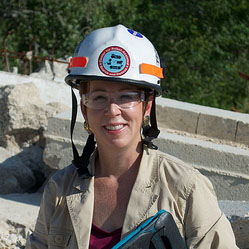Oct 31 2014
Dr. Robin R. Murphy, Raytheon Professor in the Department of Computer Science and Engineering and director of the Center for Robot Assisted Search and Rescue (CRASAR) has identified nine ways robots can protect Ebola workers. Murphy also cautions that military and civilian robots often do not directly transfer to disaster situations and more work is needed to identify the use cases for robots.
 Dr. Robin R. Murphy
Dr. Robin R. Murphy
Murphy, who is a pioneer in the field of rescue robotics, has been trained for biological response and has participated in medical disaster exercises with the US Marines Corps Chemical Biological Incident Response Forces, making her a perfect fit for the project, which she has been working on since September. Murphy has deployed ground, aerial, and marine robots to 16 disasters including the World Trade Center, Hurricane Katrina, the Japanese Tsunami, and the Fukushima Daiichi nuclear accident.
CRASAR will be hosting one of four concurrent workshops with the White House Office of Science and Technology Policy/National Robotics Initiative on Safety Robotics for Ebola Workers on Nov. 7-8. The Texas A&M workshop will focus on learning from medical and humanitarian relief experts and. The invitation-only workshop will have a second day focused on developing use cases and requirements suitable for industry to better understand how their technologies might be used. The workshop will also identify what technological barriers require further research investments.
“The real issue to me is what are the real needs that robots can play in such a complex event,” said Murphy.
According to Murphy, the ways ground, aerial, and marine robots can protect Ebola workers include:
- Mortuary robots to respectfully transport the deceased
- Reducing the number of health professionals within the biosafety labs and field hospitals
- Detection of contamination
- Disinfection
- Telepresence robots for experts to consult/advise on medical issues, train and supervise worker decontamination to catch accidental self-contamination, and serve as “rolling interpreters” for the different languages and dialects
- Physical security for workers
- Wast handling
- Humanitarian relief
- Reconnaissance